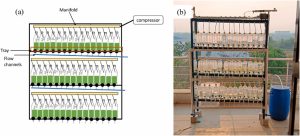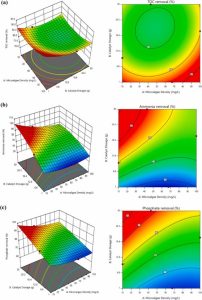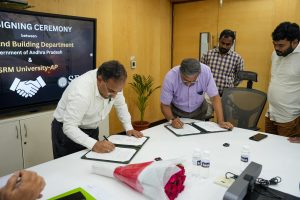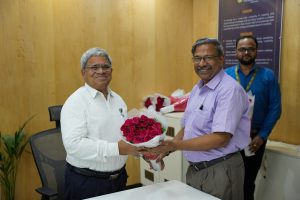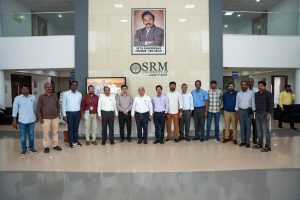Recent News
- A Sustainable Greywater Treatment Method October 3, 2024
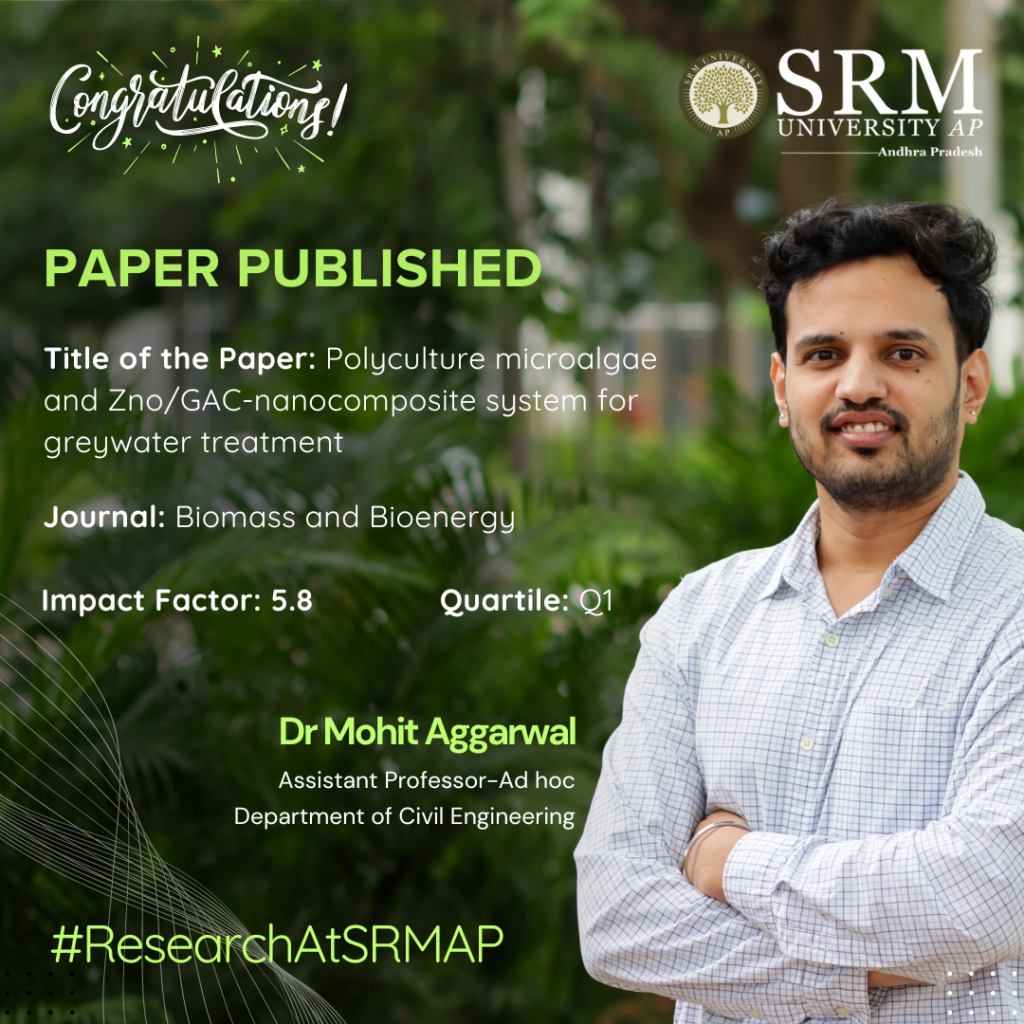
Addressing the ever-demanding crisis of water scarcity, Dr Mohit Aggarwal, Assistant Professor from the Department of Civil Engineering, has published a paper titled “Polyculture Microalgae and Zno/GAC-nanocomposite System for Greywater Treatment” in the Q1 journal Biomass and Bioenergy with an impact factor of 5.8. In his research, Dr Aggarwal explores sustainable methods to treat wastewater with algae and nanoparticles, providing an efficient method to reuse greywater and reduce water consumption.
Abstract
This study explores sustainable greywater treatment using microalgae and a ZnO/GAC nanocomposite in a 15-day batch photobioreactor. The system achieved significant nutrient removal, with 80% TOC, 94.2% PO43−, and 99.6% NH4+ efficiencies. Microalgal growth was enhanced by the nanocomposite, reaching a density of 1.8 g/L. The resulting biomass had a high heating value of 18.32 MJ/kg. The ZnO/GAC nanocomposite maintained effective removal over four cycles. The treated greywater met reuse standards for toilet flushing, with pH 8.5, turbidity <4 NTU, and COD, NH4+, and PO43− of 34, 0.032, and 0.48 mg/L, respectively.
Explanation of the research in layperson’s terms
Water scarcity and pollution are serious problems, and our research aims to find an environmentally friendly way to treat greywater (wastewater from sinks, showers, etc.). We explored the use of algae combined with special nanoparticles (zinc oxide) to clean the water more effectively. The algae grow in the water and help remove harmful substances like carbon, phosphorus, and nitrogen. The nanoparticles make this process even more efficient.
After treatment, the water is clean enough to be reused, for example, in toilet flushing. This method not only helps clean wastewater but also provides a sustainable way to reuse it, which can reduce water consumption and help the environment.
Practical implementation/ Social implications of the research
Practical implementation
The system developed in this research can be implemented in decentralised greywater treatment units, especially in water-scarce areas. It provides a cost-effective, eco-friendly solution for treating household or industrial greywater. The treated water meets the quality standards for reuse in applications like toilet flushing or landscape irrigation, reducing freshwater demand.
Social implications
This research promotes water recycling, contributing to sustainable water management practices and helping to address water scarcity issues. This can improve access to water in communities with limited resources, reduce the pressure on freshwater supplies, and lower the environmental impact of wastewater discharge, leading to healthier ecosystems and communities. Additionally, adopting such systems on a larger scale can foster greater awareness of water conservation and responsible resource usage.
Continue reading → - SRM AP Forges Partnership for Pavement Engineering September 27, 2024
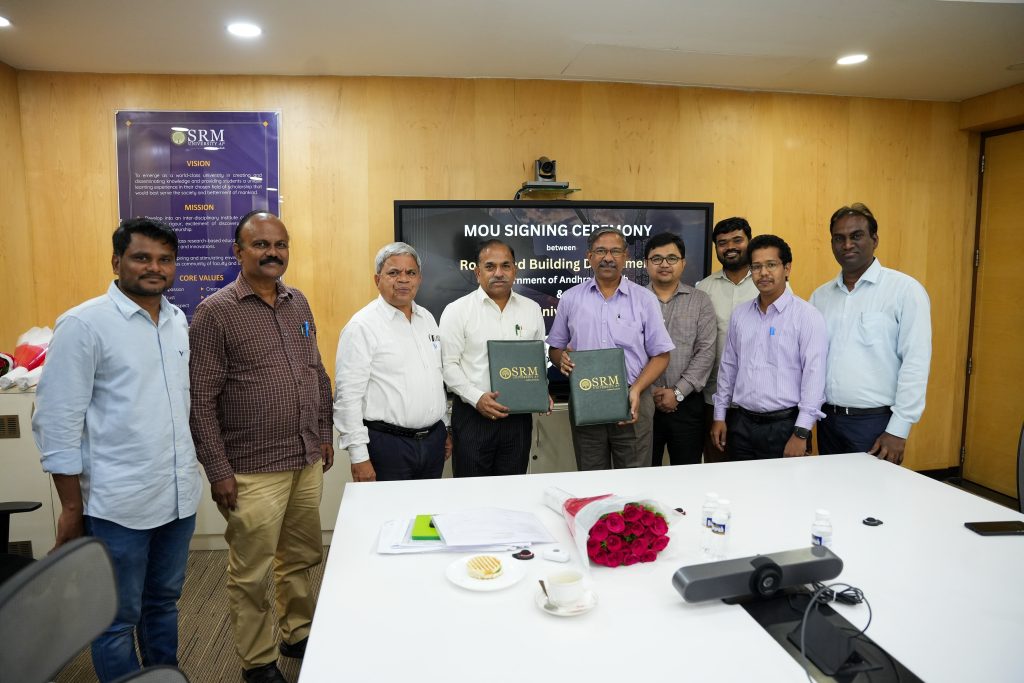
In a historic event, SRM University-AP and the Department of Road and Buildings (R&B), Government of Andhra Pradesh, signed a Memorandum of Understanding. The MoU was signed for Research, Academic and Scientific Knowledge Exchange in the field of Pavement Engineering and its allied areas.
The signing ceremony was formally executed by Dr R Premkumar, Registrar of SRM University-AP, and Sri L Srinivasa Reddy, Chief Engineer (Roads & Buildings) SH&MD, Andhra Pradesh Road Development Corporation. This significant event was witnessed by Mr K Nayeemullah, the Engineer-in-Chief (Roads & Buildings), alongside Prof. Ranjit Thapa, the Dean of Research; Dr Raviteja KVNS, the Department Head; Dr GVP Bhagat Singh, Associate Professor; Dr Uma Maheswar Arepalli, Assistant Professor; and other distinguished members of the faculty.
The collaboration poised to enhance bilateral engagement in research, pilot initiatives, and capacity-building efforts, will also foster student upskilling and reskilling through seminars, workshops, symposia, guest lectures, and co-mentorship in academic endeavours and enable them to perform better on the industrial front.
Speaking on the occasion, Registrar Dr R Premkumar stated, “This MoU serves one of the university’s goals, wherein we concentrate on positioning the university as a globally connected and regionally transformative institution of excellence.” He added that nobody is better suited than the faculty and students of SRM AP to come up with effective and affordable solutions to the problems we ourselves encounter.
“The MoU offers manifold benefits, it will enable government engineers to come and train the students and will provide them with first-hand experience in solving problems that are regional to this place”, said Mr K Nayeemullah, Engineer-in-Chief (R&B).
Dr Uma Maheswar Arepalli, Assistant Professor at the Department of Civil Engineering, SRM AP, in his statement, mentioned that the university is actively engaged in implementing the pilot study programme focused on researching cost-effective technology solutions aimed at addressing the issue of potholes across the state of Andhra Pradesh. He further stated that their team is in the process of organising a workshop aimed at raising awareness and fostering discussions on innovative approaches to infrastructure maintenance and improvement.
The MoU also aims to complement the varsity in its research endeavours by performing pilot studies and exploring new technologies including laboratory and field investigations. “The MoU will help actualise the concept of Atmanirbhar Bharat, which will only succeed if universities like SRM AP commit to providing cost-effective and real-time solutions for the betterment of society,” stated Mr Srinivasa Reddy, Chief Engineer (R&B) SH & MD APRDC.
Continue reading →


